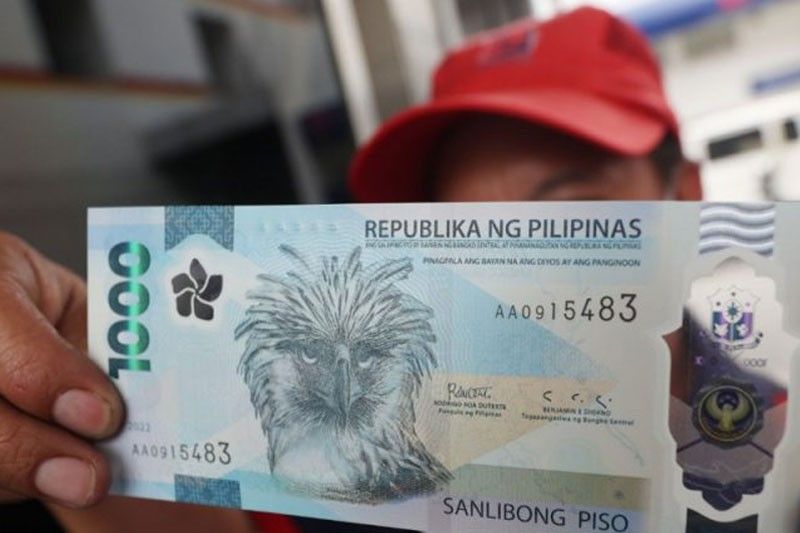Farmers’ group to BSP: Stop issuing polymer bills

MANILA, Philippines — Fearing the loss of market and income, a farmers’ group urged the Bangko Sentral ng Pilipinas (BSP) to stop issuing new polymer P1,000 bills and continue using abaca fiber to produce the banknote.
In a statement yesterday, Federation of Free Farmers president Dioscoro Granada said the BSP decision to discontinue the use of abaca in making P1,000 bills has reduced the market for the product and incomes of 200,000 abaca farming families in 56 provinces.
Granada added that BSP disregarded the concerns of the Department of Agriculture and abaca industry stakeholders by using polymer in producing the notes.
He claimed that the Philippines earns about $100 million yearly from the manufacture and export of abaca-based products.
Sen. Aquilino Pimentel III earlier cited agriculture department data that showed the country supplies 87.5 percent of the world’s abaca fiber requirements, while Ecuador and Costa Rica supplied the remaining 12.5 percent as of 2016. He had warned that the shift would hurt local producers.
On Thursday night, he told “The Chiefs” on One News channel that the BSP should work on containing inflation instead of spending government funds to print polymer banknotes that are not only impractical but also a waste of taxpayers’ money.
“The redesign of our currency is not a gut issue, so my appeal to them (BSP) is to address the problem of rising inflation… (The BSP is) spending too much time on the materials and the design of our bank notes – use your time and expertise to fight inflation. What are the measures have you thought of to fight inflation?” Pimentel said.
Amid mounting complaints over the new bill, he claimed that polymer banknotes are impractical since they are more sensitive and less flexible than the current bill, as most Filipinos store their bills in their pockets, purses, money clips or even small wallets.
Most peso notes are based mainly on durable special paper made from abaca fiber tissue and cotton.
Pimentel said he believes the BSP decision to redesign the P1,000 bill and print them using the “cumbersome” polymer sheet was done without the necessary public consultations, except through the Monetary Board, which makes its recommendation to Malacañang.
He added that the redesign of banknotes and coins must go through consultations because “when you tell them we will have new bank notes but you cannot fold them, etc., of course there’s now a backlash.”
“But if you consulted beforehand, the people will say that’s not practical and they (BSP) say ‘no, they will last if you clean them, bathe them, wipe them with a damp cloth’ – that’s not practical, nobody cleans money,” Pimentel said.
According to Granada, the farmers’ group is supporting Pimentel’s resolution to investigate the reasons and “lack of transparency” in the BSP decision to shift to polymer instead of abaca.
The group, he said, cited the complaints and apprehensions on the new bill’s non-suitability to handling practices by Filipinos and local climate conditions. The apprehensions include creasing, folding and sensitivity to chemicals and high temperatures.
In October last year, the BSP revived plans to use plastic or polymer to print banknotes, which was first introduced in 2009, in the wake of the COVID-19 pandemic.
Polymer banknotes are cleaner and less susceptible to viral and bacterial transmission due to their smooth and non-absorptive surfaces.
With this, the central bank said it will issue 10 million pieces of redesigned P1,000 bills made of polymer as part of a limited circulation test for this year.
The test is said to help determine the effects of polymerization on hygiene and public health in the wake of the COVID pandemic, environmental sustainability as well as the lifespan, durability and counterfeiting rates.
The BSP aims to collect stakeholders’ feedback and observe changes in currency handling behavior.
So far, the central bank has released two percent of the total polymer banknotes to be circulated and 0.7 percent of the estimated combined number of P1,000 paper-based and polymer banknotes in circulation.
With its release, several concerns were raised on social media regarding non-acceptance by some establishments of folded P1,000 polymer banknotes, to which the BSP said retailers and banks should accept them for day-to-day payment transactions.
- Latest
- Trending































